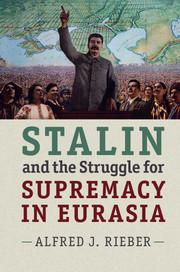Book contents
- Frontmatter
- Dedication
- Contents
- List of maps
- Acknowledgments
- List of abbreviations
- Introduction
- 1 Stalin, man of the borderlands
- 2 Borderlands in Civil War and Intervention
- 3 The borderland thesis: the west
- 4 The borderland thesis: the east
- 5 Stalin in command
- 6 Borderlands on the eve
- 7 Civil wars in the borderlands
- 8 War aims: the outer perimeter
- 9 War aims: the inner perimeter
- 10 Friendly governments: the outer perimeter
- Conclusion: A transient hegemony
- Index
2 - Borderlands in Civil War and Intervention
Published online by Cambridge University Press: 05 September 2015
- Frontmatter
- Dedication
- Contents
- List of maps
- Acknowledgments
- List of abbreviations
- Introduction
- 1 Stalin, man of the borderlands
- 2 Borderlands in Civil War and Intervention
- 3 The borderland thesis: the west
- 4 The borderland thesis: the east
- 5 Stalin in command
- 6 Borderlands on the eve
- 7 Civil wars in the borderlands
- 8 War aims: the outer perimeter
- 9 War aims: the inner perimeter
- 10 Friendly governments: the outer perimeter
- Conclusion: A transient hegemony
- Index
Summary
Stalin's higher education in foreign policy took place during the Civil War when the line between state-building and revolution became blurred. To defend and if possible expand the territorial base of the revolution, to ward off the intervention of foreign powers, to create an international revolutionary movement and to improvise the rudiments of state power were, for the Bolsheviks, all parts of the same process. Yet individual leaders invested their energies and passions in different aspects of it. As a member of the Politburo, Stalin was naturally involved in major foreign policy decisions, but his main field of action was as a member of the Revolutionary War Council and Commissar of Nationalities. Initially, he took no active part in the Commissariats of Foreign Affairs and the Comintern – the two political centers of diplomacy and revolutionary action outside the old tsarist frontiers. Stalin did not appear at a Comintern Congress until 1924.
During the Civil War, Stalin learned to trust only those forces over which he could exercise direct personal control: that is, the party organizations and the army units under his command. Lenin and Trotsky also valued disciplined political and military organizations but, unlike Stalin, who relied on them exclusively for his success, Lenin and Trotsky did not discount the importance of coordinating the activities of the Red Army and the Russian Communist Party with local and republic party organizations.
After four years of Civil War and Intervention, Stalin concluded that the Soviet nationalities policy (that is, his policy) was the key to “a fundamental improvement of relations between Turkey, Persia, Afghanistan, India and other neighboring eastern states with Russia which formerly was considered a bugbear of these countries.” Indeed, “without a systematic working out within the Russian Socialist Federated Soviet Republic of the aforementioned nationalities policy in the course of four years of the existence of Soviet power this fundamental change in the attitude of neighboring countries to Russia would be unimaginable.”
After the October revolution, when the territory controlled by the Bolsheviks shrank to the old Muscovite core, the recurrent problem of incorporating the former tsarist borderlands emerged again in acute form.
- Type
- Chapter
- Information
- Stalin and the Struggle for Supremacy in Eurasia , pp. 43 - 89Publisher: Cambridge University PressPrint publication year: 2015



